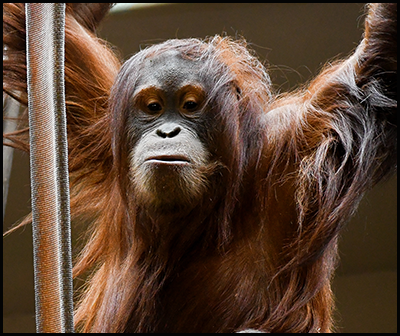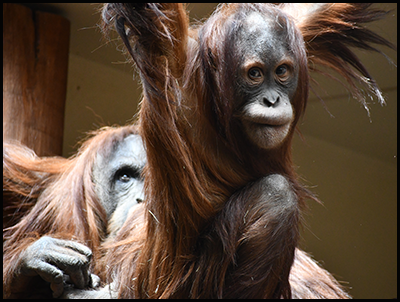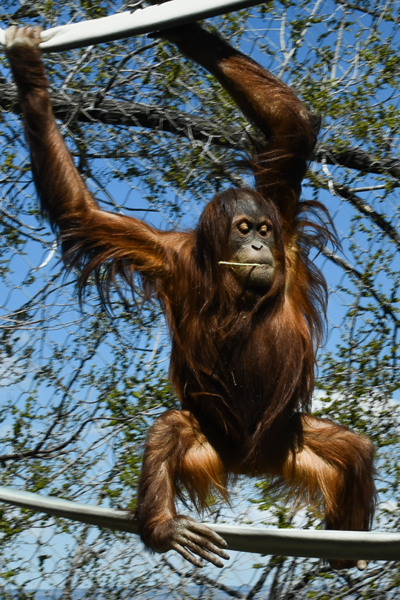The youngest ape in Primate World, 6-year-old Kera, puts the “I” in “independence,” according to Animal Keeper Izzy Dones, who works with Kera in Primate World. Kera is one of six orangutans in Primate World, and one of three Sumatran orangutans, along with her mom, Sumagu, and her dad, Baka-Keri.

“I think her independence comes from Sumagu,” Izzy says. “Sumagu really beats to the rhythm of her own drum. She will let you know if she wants to come over to train or if today is not the day. It’s like she has seen it all and knows exactly what she wants, and I love that.”
Orangutans learn through behavior modeling, and Kera is an astute observer.
“When Kera was really young, Sumagu participated in voluntary training with us and Kera watched closely and mirrored her mom’s behaviors,” Izzy says. “Kera learned a lot of her body presentations and stationing that way, which we teach so she can voluntarily participate in her own health care.”
Clever Kera is a whiz at husbandry training. She does an open-mouth presentation so keepers can brush her teeth. A recent dental check revealed another sign the baby orangutan is growing up. She lost her first baby teeth!
“If she’s near the window, guests can open their mouths and show her their teeth, and she’ll usually show them hers,” Izzy says. “She just lost her first two teeth in February, so you might be able to see where she has lost her two middle bottom teeth and her new ones are growing in.”
Kera is also smart enough to know that her behaviors are valuable to her keepers – valuable enough to earn her yummy treats. One behavior, called “trading,” allows keepers to ask the great apes to bring them something from their dens, like small reusable PVC tubes that keepers stash food in. When those tubes are empty, keepers ask for them back.
“Some mornings, I’ll come in and she’s waiting at the fence with a pile of theses tubes she has collected and she’s ready to trade,” Izzy says. “She’s like, ‘Okay you can have these, but only for the right treat and only one at a time.’ She’ll even tear items, like blankets, into smaller pieces so she has more pieces to trade. Her dad does that, too, so we think she learned that little hack from watching him. The more pieces you have to trade, the more treats you get. It makes sense.”
Playful and curious, young Kera loves interacting with guests and keepers. One of her favorite activities is to play tug-of-war. She picks up a blanket and brings a corner of it to the fence so a keeper can pull it through the mesh, and Kera pulls with all of her little orangutan might.
“Kera plays with guests, too,” Izzy says. “She loves to climb up on a rope and swing towards the glass where guests are watching her. She gets really excited when guests start interacting with her. She’s also curious to see what people have in their bags. She’ll get up high and try to look into people’s purses, which always makes me laugh.”

As an ambassador for her species, Kera is a pro. She naturally seeks opportunities to interact and make connections with guests, which inspire them to take action to protect her wild counterparts.
Orangutans are critically endangered, in part because of deforestation to build palm oil plantations in their native habitats. Palm oil is an edible oil found in about half of the products consumers purchase. It is used in candy, soaps, cosmetics, pet food and cleaning products. Because of high demand, unsustainable palm oil production has resulted in deforestation across Southeast Asia, and other tropical areas around the world, which means critically endangered species like orangutans, tigers and elephants are losing their homes.
However, when produced sustainably, palm oil is the most productive edible oil available. Oil palms – the trees that palm oil comes from – produce four to ten times more oil than alternatives like soy, olive, canola and coconut. Switching to these alternatives would cause even more deforestation in tropical areas, which is why consumers must demand sustainable palm oil.
Cheyenne Mountain Zoo, under the direction of the World Association of Zoos and Aquariums (WAZA), helped launch a free global mobile app, called PalmOil Scan, that gives everyone the power to advocate for orangutans’ dwindling wild habitats with their shopping choices, and to make large companies listen to their demands for sustainably produced palm oil.
The free smartphone app empowers consumers to make informed, environmentally-friendly shopping decisions, just by scanning the barcode on a product to see if that company has committed to sourcing sustainable palm oil. PalmOil Scan is available on the Apple App Store and Google Play in the U.S., Canada, the U.K., New Zealand and Australia, with plans to expand to more countries around the world. Learn more at cmzoo.org/palmoil.

